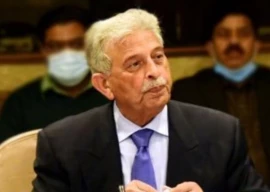
They say where there’s a will there’s a way, and as more than 440,000 “change makers” in Pakistan have discovered, there are many ways to bring about a positive change for women.
These change makers are part of the We Can Global Network (WCGN), which aims to reinforce this positive behaviour by ending Violence Against Women (VAW). These change makers are persons who have pledged not to commit any violence against women and are striving for their rights. The goal of the network is to achieve a fundamental shift in social attitudes and beliefs towards women.
November 30 henceforth will be marked as the International ‘We Can’ Day every year in Indonesia, Bangladesh, Sri Lanka, Nepal, India, Pakistan, Uganda, Democratic Republic of the Congo, Tanzania, Niger, Burundi, Kenya, Netherlands and Canada.
To mark the conception of this day and show the regional assessment and results of the We Can Campaign thus far, a book “Measuring Change” written by Suzanne Williams was launched here on Wednesday. Williams, an international consultant in social development with 30 years of experience in a wide range human rights issues, gender equality, and ending violence against women, has been working with Oxfam GB and documenting the We Can campaign for several years.
The report draws upon a consolidated regional report and some of the country reports of the 2010 assessment of Phase 2 of the campaign in five countries -- Bangladesh, India, Nepal, Pakistan and Sri Lanka. Based on these findings, the report has tried to represent the campaign’s successes and challenges that were faced during field work to present a realistic and balanced picture of the proceedings till now.
According to the assessment almost all change makers (91%) indicated some level of change due to the campaign’s activities.
An example of this change is Rabia Jan, 22, from a lower middle class family in Dherri Kattikhel Nowshera District. She defied her family and pursued education. “I can [now] see a substantial change in my life. A few years ago, I would not even have thought of studying in a college, practicing law, or travelling with male colleagues. Now it seems possible.”
Published in The Express Tribune, December 1st, 2011.
































1714024018-0/ModiLara-(1)1714024018-0-270x192.webp)









COMMENTS
Comments are moderated and generally will be posted if they are on-topic and not abusive.
For more information, please see our Comments FAQ